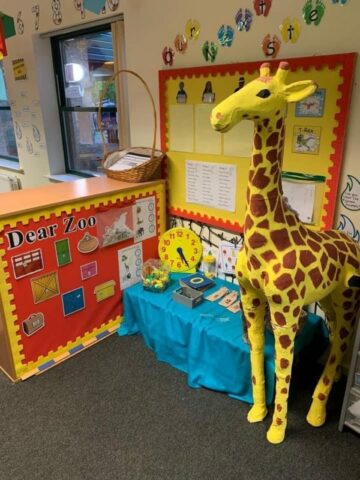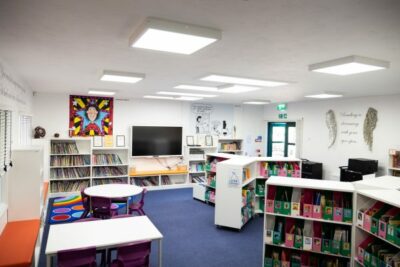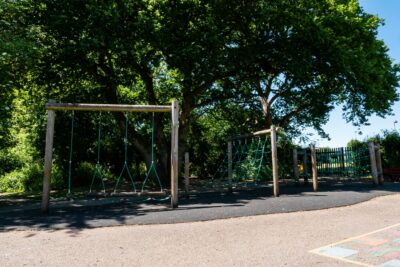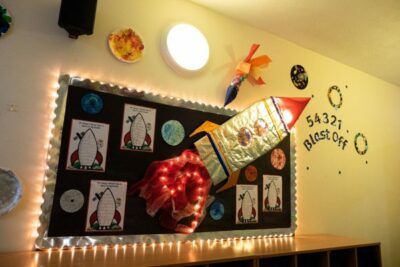Who is IQM?
IQM is the only national inclusion award in the UK. For over 20 years and in over 20 countries, schools, MATs and Local Authorities use the Inclusion Quality Mark to recognise exemplary inclusive practice.
Get in touch for your FREE school information pack today.
Peartree Spring PS Achieves Flagship Status
April 6, 2023
Peartree Spring Primary School has achieved the Inclusive School Award with Flagship status.

Energy and Insight of the Headteacher
Peartree Spring is a 3-form entry school with 622 pupils on roll. Of the total, 169 pupils are receiving Special Educational Needs and Disability (SEND) support and 14 have Education Health Care Plans (EHCPs) with a number of applications undergoing the Local Authority assessment process. The most recent data shows attendance at the school is 94.5%. The IQM assessment day gave the Headteacher and other senior leaders the opportunity to both review and celebrate the achievements of the school, and to appreciate the challenges that have been overcome to secure what is now a most empowered and empowering learning community. The sphere of influence of the outstanding work of those leading the school reaches out not only to the local school community but to the entire town and beyond. Against a backdrop of significant local deprivation and social challenges, staff at Peartree Spring Primary School share expertise, experience and support involving the whole town community.

The Local Authority has devolved much of its responsibility for SEND provision to area specific groups of schools and other professionals. The scheme known as DSPL (Delivering Special Provision Locally) is led by the Headteacher at Peartree Spring and has given schools the opportunity to work closely with professionals who understand local need and provision. Because of its geographical location it is known as DSPL(2); the overall Manager is also based at the school. It is clear that her overview of need and provision within the town and her calm, clarity of thinking, plus the energy and insight of the Headteacher, are significant elements of its success.
Parents Recognise the Very Strong Leadership
Parents recognise the very strong leadership of the Headteacher, senior leaders and the staff team with their unwavering commitment to inclusion, especially for those pupils with additional needs. A strong focus on mental health and wellbeing for pupils and staff is underpinned with a continuous drive for improvement and an understanding of pedagogy and access routes to appropriate resources. Some pupils travel from beyond the school’s catchment across the town to access a placement.

The overall wellbeing of pupils, their families and staff at the school are key concerns of Senior Leaders. Family Liaison Workers (FLWs) reach out to the whole community and their work threads through every area of school life. Links with families were strengthened during Covid times as FLWs and other staff members worked hard to provide support structures.
Building on these established relationships has helped to further develop a culture of trust which influences the whole parent community. A recent letter sent to parents and carers demonstrates the kindness and practical action emanating from the school. It states, ‘we are here to support you with any worries you may have. These could be around your child’s education, transition, behaviour and wellbeing or help to provide advice and support around home life and routines’. The letter goes on to acknowledge the current cost of living crisis and draws attention to an information sheet detailing local support available regarding help with food and heating. The key concern of the FSWs is that all families should feel supported and included within the caring school community.
Child’s View of the World
Staff have noticed that, since Covid times, there is a greater openness amongst parents who are more ready to share their problems. Staff presence at the school gates in the morning and afternoons not only facilitates a swift start and end to the school day for pupils but gives parents an opportunity to speak with senior leaders or a FSW. Mental health concerns presented through anxiety and depression are often shared with the FSWs or other members of staff; there are times when the school sees role reversals where the child is caring for the parent.
As leaders of DSPL(2), courses addressing family life issues are offered to parents of children attending schools across the town as well as those with children at Peartree Spring. This includes involvement in a Parents’ Mental Health Day and courses on topics such as Autism and Attention Deficit Hyperactivity Disorder (ADHD), helping parents to understand their child’s view of the world and how to cope with challenging situations. Parents are encouraged and supported if they wish to access specialist help from mental health organisations.
Recognition of the close relationship between physical and mental wellbeing are at the core of the many projects undertaken. The Physical Education lead member of staff embeds this understanding and helps children, parents and staff identify how involvement in physical activity can release a ‘feel good factor’ to improve wellbeing. She is passionate about inclusion in sports activities and over time has developed a highly positive relationship with a local school for pupils experiencing physical and learning disability. Children from both schools visit each other’s settings, sharing activities so that everyone can be involved in the experience. Disability is normalised by the introduction of adapted activities, with challenges for all pupils. As described in the ‘targets section’ of this report, pupil, staff and family wellbeing, plus practical action, underpin the ethos of the school.

A wide range of special activities help support the wellbeing of children and families and senior leaders firmly believe that emotional health and resilience are key qualities of happy, healthy communities.
Wellbeing days and activities such as’ Just Talk’ weeks and ‘Five Ways to Wellbeing’, are carefully planned to support the curriculum and are at the forefront of discussion about the needs of pupils and their families. It is popular for parents to book a slot during consultation sessions to speak to the Physical Education specialist teacher. For those whose children shine at sport or are less inclined towards success in other subjects, it gives an opportunity for parents to be really proud of their child’s achievements.
Totally Child-Led Curriculum
During the course of the review day, our Assessor was able to spend time in all 3 key stages which, following Covid restrictions during previous visits, gave a very powerful understanding of the principles underpinning the school ethos. In both Key Stage 1 (KS1) and Key Stage 2 (KS2), pupils with additional needs were being supported appropriately whilst at the same time learning independently at their own level.
A calm, purposeful atmosphere plus the provision of appropriate resources and nearby adult support if needed, demonstrated the importance staff give to individual difference and inclusion. At KS2 a small group were using technology to complete tasks which had been selected to meet individual need. In most cases these pupils were working well below age expectations but their joy in successfully completing tasks at their own level was very evident.
Within the Foundation Stage reception class, the excitement for learning was intense. The totally child-led curriculum means that the needs and interests of every child are constantly being reviewed and noted; the teacher in charge of the unit described several activities and learning areas that have been designed in response to children’s interests. The ‘free flow’ of learning between indoors and outdoors and the wide range of beautifully maintained resources is a credit to her leadership and the diligence of a most committed team. Support for a child with a profound level of need was very discreet and was not obvious when our Assessor was observing the children at play. Teaching Assistants shared responsibility for this role which meant that the child was not overly dependent on 1 adult and also gave members of staff a break from the intensity of their responsibility.

The Chair of Governors experiences the inclusive nature of the school first hand through her formal role and as a parent of a child in the school. She is a frequent visitor and described how the team at Peartree Spring becomes excited by new challenges.
If a child experiences barriers to their learning, they meet the situation with a well-articulated plan for the way forward. Challenges are seen as opportunities and she described her personal experience of the speed with which issues are picked up. Senior leaders are not afraid to try a fresh approach and she described how class assemblies have, following Covid, continued to be shared online rather than live in the school hall. The advantage of this is that families can sit together to watch the assembly at home and no child feels ‘left out’ if their parents cannot attend the school presentation in person.
As Chair of Governors, she has noticed the attachment of staff to the school with many being considered to be ‘home-grown,’ as they have progressed over time from a junior teacher role to that of senior leader.
A ‘Haven’ Within Stevenage
The Chair of Governors described the school as a ‘haven’ within Stevenage. This is a perfect description as the surrounding area was one of the early ‘new town’ neighbourhoods and as such is defined by the 1950s ‘new-build’ style. At the heart of this estate is the school that has been so tastefully modernised and amalgamated (having previously been 2 schools) under the watchful eye of the current Headteacher. The spacious site and attractive outdoor areas are enticing, offering respite from the busy road and life outside.

Meeting with a group of pupils representing the School Council was a joyful experience. They articulated the school’s commitment to inclusion without any need for adult prompting and even surprised the staff who were present with the examples they gave. Personal experiences they described were heartfelt and they gave the impression that they would always carry the important message of equality and inclusion with them.
As pupils at a Rights Respecting School, they were able to describe the school’s mission and even the younger members of the group understood why it is the right of all children to have their need for love, food, shelter and education met. The School Council members are a credit to the school.
Strong Commitment to Inclusive Practice
The Headteacher at Peartree Spring Primary School is highly regarded locally and beyond for her strong commitment to inclusive practice and its powerful influence to affect positive change and provision across the Stevenage Borough. Education for primary aged children in Stevenage, who have been excluded from their mainstream setting, is provided at a specialist centre managed by the Headteacher and senior leaders at Peartree Spring.
The Willows Centre supports up to 8 pupils who have had carefully monitored, tiered support over a period of time which is an essential part of the criterion for a place at the centre. Highly trained staff manage and teach at the centre and are totally dedicated to their overall aim which is reintegration of pupils into their original mainstream setting. Placements at The Willows are in very high demand from schools across the town which means that a stringent admissions process is essential. However, the expertise of the management team and those who work at The Willows is shared via DSPL(2) so that pupils who are not able to attend the centre can benefit from the learning and experience of professionals.
Find out more about the IQM Inclusive School Award
If your school is interested in obtaining the IQM Inclusive School Award or you wish to talk to a member of the IQM team please telephone:
028 7127 7857 (9.00 am to 5.00 pm)
or email: info@iqmaward.com for further details.
Want more information on the IQM Award? Click here to request your free IQM information pack.
Other Posts

About IQM
The only national award for inclusion in the UK, IQM has been committed to recognising exemplary inclusive schools for over 20 years and in over 20 countries around the world. The three awards allow schools and organisations to celebrate their inclusive practice against nationally recognised framework.
Site Links
© 2026 Inclusion Quality Mark | website developed & cared for by digidoda


